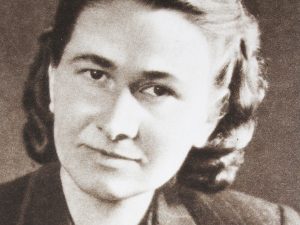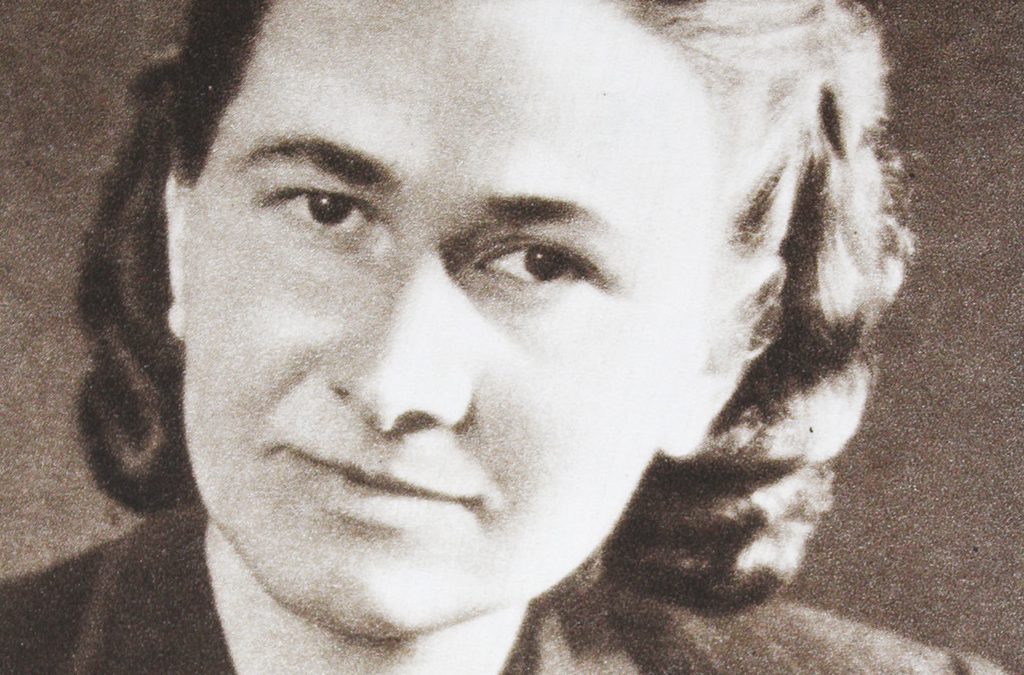
Vida Tomšič (1913-1998) was a Slovenian law graduate and politician, mostly known for her contribution to gender, welfare and development policies in Yugoslavia and internationally during the second half of the 20th century.
She was born as Vida Bernot on the 26th of June 1913. She was the daughter of Ivan Bernot, a teacher, and Franja Rozman, a housewife, and had three brothers and one sister. Franja was raised in a poor farming family and started to work in her teenage year as a maid of the Bernot family, giving birth to an illegitimate child before Ivan decided to marry her against the will of his family. This background shaped Vida’s awareness of gender and class injustice early on. After completing her high school diploma in 1931, she enrolled first in the faculty of philosophy, studying history and geography. During her studies she became involved in left-wing students’ movements and joined the then clandestine communist party in 1934. In 1936 she enrolled in the faculty of law, from which she graduated in 1941.
Due to her activism in the then outlawed communist movement, Vida was first arrested in 1935 and spent 11 months in prison. On 13 December 1937 she married Tone Tomšič, one of the leaders of the communist movement in Ljubljana. At the 5th conference of the Yugoslav Communist Party in Zagreb she pronounced her first famous speech on work among women, where she first asserted the inextricable link between the struggle for women’s emancipation and the revolutionary struggle for the emancipation of the proletariat. During the Italian occupation of Ljubljana, Vida Tomšič was arrested together with her husband in December 1941, five months after having given birth to her first son, who had been hidden first with a network of supporting families, and then with grandmother Franja. Tone Tomšič was shot in May 1942 while Vida was sentenced to 25 years in jail and deported to different prisons across Italy, where she underwent severe mistreatment and punishments due to her relentless revolutionary organizing among fellow prisoners. She managed to escape after the capitulation of Italy in 1943 and rejoin the resistance in on the coast, eventually returning to Slovenia in 1944. The entire Bernot family was involved in the antifascist resistance struggle during War World Two. Vida’s younger brother Branko was killed during the partisan struggle shortly before the liberation.
After the war, Vida reunited with her son and kept the surname Tomšič in honour of her first husband, preserving his legacy over the years. She later remarried with fellow partisan Franc Novak, a leading gynaecologist-obstetrician, and had a daughter and another son. She became a key figure both in Slovenia and Yugoslavia and occupied key political positions, such as Minister for social policy in the first postwar Slovenian government. Other positions included: President of the Antifascist Front of Women of Yugoslavia (1948-1952), President of the Assembly of Slovenia (1962-63), President of the House of Nations of the Assembly of Yugoslavia (1967-68); President of the Federal Council for Family Planning (1971-1976). Her international activism was also very prominent, as she was twice member of the Yugoslav delegation to the sessions of the General Assembly of the UN (in 1954 and 1970); she was also the Yugoslav representative in the Social Development commission of the ECOSOC for two mandates (1960-63 and 1971-74), which she also chaired in 1963. Tomšič was involved in several expert meetings and led the Yugoslav delegation at the UN Women’s Conference in Mexico City (1975) and was member of the Yugoslav delegations in Copenhagen (1980) and Nairobi (1985). She was also part of the Board of the INSTRAW, the International Research and Training Institute for the Advancement of Women located in Santo Domingo.
Over the years, also thanks to her status as a partisan heroine and pioneer of welfare institutions, she took part in many international visits and bilateral meetings, facilitated by her partial knowledge of English, Italian, German, Russian and French, as listed in one declaration that she compiled. She was involved in various domestic and international initiatives and conferences related to women’s rights, development, and family planning until her official retirement in July 1984. Her interest in women’s issues continued after retirement, for instance when she lectured in Sarajevo in the late 1980s within the UNFPA-sponsored summer school organized at the University of Sarajevo for women from Asia, Africa, and the Middle East on the theme of planned parenthood. Until the end of her life she kept following international events on the status of women, such as the 1995 Beijing conference. She died in Ljubljana in 1998 and is buried in the Zale cemetery with the Novak and Bernot families. Tone Tomšič is buried in the Tomb of National Heroes in the centre of Ljubljana.
Throughout her life, Vida Tomšič greatly contributed to various legislative achievements that shaped women’s lives in socialist Yugoslavia, from maternity leaves to childcare assistance, to family planning and contraception. The socialisation of motherhood and childcare in the late 1940s and 1950s, the liberalisation of abortion rights in the 1960s, the affirmation of family planning as official state policy and the inclusion of the right to freely decide about childbirth in the 1974 Yugoslav Constitution was largely the result of hers and her collaborators’ efforts. She was also very influential internationally, particularly when it came to discussion on women's active participation to development processes during the UN Decade for Women (1975-1985) and the necessity to think of women’s emancipation as interdependent with global economic and political justice. Her contacts with women from the Global South, especially in India, were significant, because of the numerous bilateral relations established by Yugoslavia through the Non-Aligned Movement. As an award for her life work, she was nominated full professor of family relations at the Law faculty in Ljubljana in 1978 and received an honorary doctorate in 1979.
Chiara Bonfiglioli (University College Cork)
Bibliography
-
-
Mateja Jeraj, “Vida Tomšič” in Francisca de Haan, Krasimira Daskalova, Anna Loutfi (eds), A Biographical Dictionary of Women's Movements and Feminisms: Central, Eastern and South Eastern Europe, 19th and 20th Centuries. Budapest: Central European University Press, 2006: 575-579.
-
Chiara Bonfiglioli, “Women’s Internationalism and Yugoslav-Indian Connections: From the Non-Aligned Movement to the UN Decade for Women”. Nationalities Papers, 49(3), 2021, 446-461. doi:10.1017/nps.2020.11.


